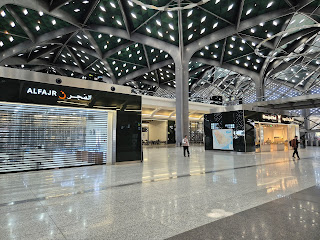By Muhsin Ibrahim
Even a visually impaired individual can perceive the evident transformation taking place in Saudi Arabia. Although we came from Germany, a country renowned for its technological advancements, we express our admiration for the aesthetic and infrastructural qualities of the Haramain High Speed Railway station.
Furthermore, we observed a vast expanse of land undergoing construction, situated a short distance from the station. The name of this project, the Knowledge Economic City, provides an indication of its intended purpose. This is part of the Vision 2030 project.
Additionally, numerous construction sites for hospitals, schools, and other facilities are visible in the surrounding area of the railway station. However, further reform is necessary.
Our taxi driver appeared to be of South Asian descent. During our brief conversation, I discovered that despite his grandfather being born in Saudi Arabia, he does not possess a Saudi passport and is considered Bangladeshi by the authorities. I inquired if he had ever visited Bangladesh, to which he replied in the negative. This situation is unfortunate.
Western nations grant citizenship to individuals who reside there for a relatively short duration. In countries like the United States and Canada, citizenship is automatically conferred upon those born within their borders. This privilege contributes significantly to the growth and development of these nations. It would be beneficial for the Saudi authorities to adopt similar policies.
Foreign nationals and naturalised citizens should be welcomed and embraced. In many cases, they demonstrate greater enthusiasm and determination to succeed, driven by a desire to prove their worth. These individuals often become highly motivated and accomplished.
Without such policies, countries like the United States might not have had the opportunity to have a president like Barack Obama, and the United Kingdom might not have had a leader like Rishi Sunak.
May our nations also prosper and flourish, amen.
- Muhsin

Comments
Post a Comment